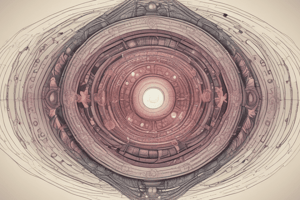Podcast
Questions and Answers
What is the first fetal movement observed in humans?
What is the first fetal movement observed in humans?
- Regular body movements
- Kicking
- Lateral bending
- Head and neck flexion (correct)
At what week of pregnancy do regular body movements start?
At what week of pregnancy do regular body movements start?
- 12th week
- 15th week (correct)
- 20th week
- 10th week
What indicates fetal distress during pregnancy?
What indicates fetal distress during pregnancy?
- Increased fetal movements
- Consistent kicking
- Frequent hiccups
- Decreased fetal movements (correct)
How does the cervix function during pregnancy?
How does the cervix function during pregnancy?
What factors influence how the embryo and fetus are shaped?
What factors influence how the embryo and fetus are shaped?
What developmental systems were examined during the previous course?
What developmental systems were examined during the previous course?
What type of movements can be measured in embryos and fetuses?
What type of movements can be measured in embryos and fetuses?
What happens to fetal tissues in response to mechanical forces?
What happens to fetal tissues in response to mechanical forces?
Which aspect of pregnancy is influenced by the biomechanical properties and effects?
Which aspect of pregnancy is influenced by the biomechanical properties and effects?
What is kinesiology primarily concerned with?
What is kinesiology primarily concerned with?
What essential change occurs in the cervix during the second and third trimesters of pregnancy?
What essential change occurs in the cervix during the second and third trimesters of pregnancy?
What dilation measurement is necessary for birth to occur?
What dilation measurement is necessary for birth to occur?
Which condition is characterized by abnormal or absent fetal movement?
Which condition is characterized by abnormal or absent fetal movement?
What has a notable effect on the risk of Developmental Dysplasia of the Hip (DDH)?
What has a notable effect on the risk of Developmental Dysplasia of the Hip (DDH)?
At what week of pregnancy do fetal movement patterns typically begin to occur?
At what week of pregnancy do fetal movement patterns typically begin to occur?
What is one of the internal physical factors affecting fetal movements?
What is one of the internal physical factors affecting fetal movements?
Which of the following is a key external factor influencing fetal movements?
Which of the following is a key external factor influencing fetal movements?
Which type of dislocation begins during the first or second trimester?
Which type of dislocation begins during the first or second trimester?
What condition is characterized by multiple congenital contractures resulting from decreased fetal movement?
What condition is characterized by multiple congenital contractures resulting from decreased fetal movement?
What describes the loss of contact between the femoral head and the acetabulum in hip dislocation?
What describes the loss of contact between the femoral head and the acetabulum in hip dislocation?
How does excess weight gain during pregnancy affect the musculoskeletal system?
How does excess weight gain during pregnancy affect the musculoskeletal system?
Which hormonal changes are linked to low back pain during pregnancy?
Which hormonal changes are linked to low back pain during pregnancy?
What postural change is commonly seen during pregnancy?
What postural change is commonly seen during pregnancy?
Which of the following is a consequence of changes in gait during pregnancy?
Which of the following is a consequence of changes in gait during pregnancy?
What internal forces are significant during pregnancy?
What internal forces are significant during pregnancy?
What term describes the condition of leg alignment changing from genu varum at birth to another alignment by age three?
What term describes the condition of leg alignment changing from genu varum at birth to another alignment by age three?
What effect do primitive reflexes have on an infant's movement ability?
What effect do primitive reflexes have on an infant's movement ability?
How does gravity affect the biomechanical interactions between the mother and fetus?
How does gravity affect the biomechanical interactions between the mother and fetus?
What is NOT a postural change associated with pregnancy?
What is NOT a postural change associated with pregnancy?
What contributes to the decreased strength of abdominal muscles during pregnancy?
What contributes to the decreased strength of abdominal muscles during pregnancy?
Flashcards
Fetal Movement
Fetal Movement
The movement of the fetus within the uterus, detectable by the mother and measurable by physicians.
Biomechanics of Embryo/Fetus
Biomechanics of Embryo/Fetus
Study of the mechanical forces and interactions that shape the embryo and fetus within the uterine environment.
Fetal Distress
Fetal Distress
A sudden change in the frequency or intensity of fetal movements, a possible indication of problems.
Uterine Environment
Uterine Environment
Signup and view all the flashcards
Embryonic Movement
Embryonic Movement
Signup and view all the flashcards
Biomechanical Properties
Biomechanical Properties
Signup and view all the flashcards
Cervix and Pregnancy
Cervix and Pregnancy
Signup and view all the flashcards
Kinesiology
Kinesiology
Signup and view all the flashcards
First Fetal Movement
First Fetal Movement
Signup and view all the flashcards
Fetal Tissues
Fetal Tissues
Signup and view all the flashcards
Cervix Function During Pregnancy
Cervix Function During Pregnancy
Signup and view all the flashcards
Fetal Movement Patterns
Fetal Movement Patterns
Signup and view all the flashcards
Fetal Akinesia Deformation Sequence (FADS)
Fetal Akinesia Deformation Sequence (FADS)
Signup and view all the flashcards
Arthrogryposis
Arthrogryposis
Signup and view all the flashcards
Developmental Dysplasia of the Hip (DDH)
Developmental Dysplasia of the Hip (DDH)
Signup and view all the flashcards
Cervical Dilation
Cervical Dilation
Signup and view all the flashcards
Hip Instability
Hip Instability
Signup and view all the flashcards
Hip Dislocation
Hip Dislocation
Signup and view all the flashcards
Paralytic Dislocation
Paralytic Dislocation
Signup and view all the flashcards
Typical Dislocation
Typical Dislocation
Signup and view all the flashcards
Pregnancy Biomechanics
Pregnancy Biomechanics
Signup and view all the flashcards
Center of Mass Shift
Center of Mass Shift
Signup and view all the flashcards
Anterior Pelvic Tilt
Anterior Pelvic Tilt
Signup and view all the flashcards
Lumbar Lordosis Increase
Lumbar Lordosis Increase
Signup and view all the flashcards
Hormonal Changes
Hormonal Changes
Signup and view all the flashcards
Primitive Reflexes
Primitive Reflexes
Signup and view all the flashcards
Motor Development
Motor Development
Signup and view all the flashcards
Biomechanical Interactions (Mother-Fetus)
Biomechanical Interactions (Mother-Fetus)
Signup and view all the flashcards
Gait Changes
Gait Changes
Signup and view all the flashcards
Low Back Pain during Pregnancy
Low Back Pain during Pregnancy
Signup and view all the flashcards
Study Notes
Weekly Learning Outcomes
- Understand the biomechanical interactions between the embryo/fetus and the uterine environment.
- Learn the significance and patterns of fetal movements.
- Identify pathologies related to insufficient fetal movement.
- Explain the biomechanical properties and effects of pregnancy.
About the Previous Course
- Examined the developmental processes of the nervous system and musculoskeletal system in the fetal period.
- Evaluated the role of brain and spinal cord structures in motor skill development and nervous functions.
- Discussed how bones and muscles form during the fetal period and their impact on the fetus.
- Examined muscle tone changes during the fetal period.
Kinesiology of Normal Motor Movement
- Kinesiology is the study of human movement.
- Kinesiology combines understanding of anatomy, biomechanics, and physiology.
Embryo, Fetus, and Uterus Biomechanics
- Embryo movement occurs on a microscopic level before the mother is aware.
- Embryo/fetus development is influenced by mechanical forces in the environment.
Fetal Movements
- Specific fetal movements like head and neck flexion are observed in the 10th week.
- Regular body movements start at 15 weeks.
- Fetal movements are detected by the mother at around 17-20 weeks.
- Precise measurement techniques are required for observing and measuring fetal mechanics.
Physical Factors Affecting Fetal Movements
- Fetal movement is influenced by intrauterine space, amniotic fluid, fetal position, and the sex of the fetus.
External Factors Affecting Fetal Movements
- A mother's diet and acoustic stimuli can influence fetal movement.
Arthrogryposis
- Multiple congenital contractures are a characteristic of this syndrome.
- Reduced fetal movement is a key component of this condition.
Hip Instability, Dysplasia, or Dislocation
- Hip instability involves a poor fit between the femoral head and acetabulum.
- Abnormal femoral head movement is a key component of this condition.
Developmental Hip Dysplasia and Dislocation
- The acetabulum and femur are unstable, and the femoral head dislocates.
Dislocation
- Dislocation involves a loss of contact between the femoral head and acetabulum.
- Paralytic dislocation is linked to neuro-muscular problems and occurs early in pregnancy.
- Typical dislocation occurs naturally.
Pregnant Biomechanics
- Pregnancy is a natural process. Pregnancy weight gain makes musculoskeletal adaptation difficult.
- Posture and gait are affected due to changing center of mass.
- Body's kinematic adjustments aid in stability during pregnancy.
A Series of Biomechanical and Hormonal Changes
- Pregnancy-related hormonal changes affect back pain and risk of falls.
- Pregnancy impacts quality of life in a negative way.
- Progesterone and relaxin hormones contribute to changes in spinal curves (lordosis & kyphosis).
- Pregnancy causes reduced abdominal muscle strength.
- Pregnancy-related shifts in pelvic tilt affect movement.
While Walking
- Step width increases.
- Stride distance decreases.
- Walking speed slows down.
Postural Changes During Pregnancy
- Pelvic tilt, lumbar lordosis, gravity line shifts and spinal curves (kyphosis and lordosis) alter.
- Shoulder and cervical regions are also affected.
Mechanical Forces Affecting Fetal Development
- Internal and external forces influence fetal development.
- Internal forces like tendon, ligaments, and muscle contraction are relevant.
- External forces like gravity are also significant.
Gross Motor
- During pregnancy, primitive reflexes appear.
- As the central nervous system (CNS) develops, reflex-based movements are suppressed.
- Asymmetric Tonic Neck Reflex affects full rotation and midline hand use.
- The Moro reflex impacts sitting and head control in infants.
Corrective and Balance-Preserving Reactions
- Corrective and balance-preserving reflexes appear along with primitive reflexes.
- These reactions help infants to sit up and establish head and body control.
Movement of Arms and Legs / Walking
- Motor skills develop to include movement of arms and legs independently.
- Walking backwards and kicking objects occurs after 2 years of age.
What to Take Home?
- Motor development during pregnancy was covered.
- Details about embryonic, fetal and uterine development was established.
- Developmental significance of fetal movements was explored.
- Conditions arising from insufficient fetal movement were explored.
- Biomechanical interactions between mothers and fetuses were discussed.
Questions and Suggestions
- Which hormone is linked to increased back pain during pregnancy?
- Are biomechanical and hormonal changes related to back pain and falls in elderly?
- When is the first fetal movement (head and neck flexion)? and (genu varum to genu valgum) change?
- When do distinct patterns of fetal movement appear?
Studying That Suits You
Use AI to generate personalized quizzes and flashcards to suit your learning preferences.




